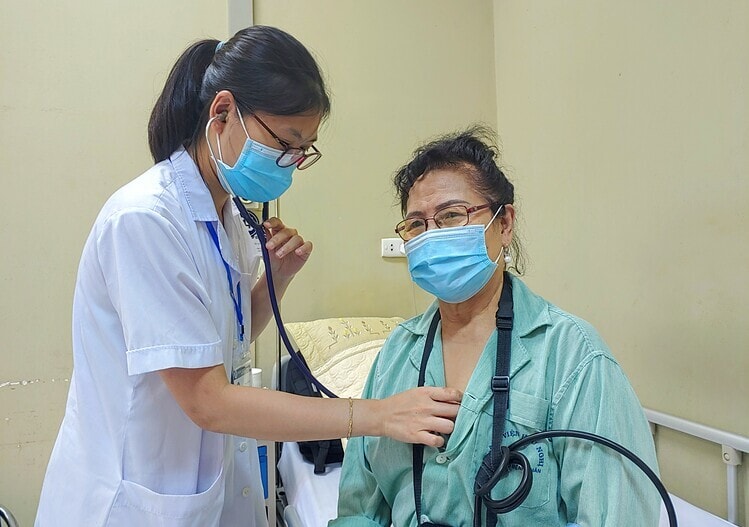Many times in critical condition just because of eating salty food
77-year-old woman, since the beginning of the year, has been hospitalized 5 times due to high blood pressure, rapid heart rate, and a hard-to-quit habit of eating salty foods.
The patient was last hospitalized in October, when his blood pressure reached 200/100 mmHg, compared to the standard level of 120/80 mmHg. He had a history of high blood pressure for 10 years, along with other diseases such as heart disease, atherosclerosis, diabetes, and fatty liver.
The difference in this patient is that he has a habit of eating very salty food. Although he cannot estimate the amount of salt he eats every day, he always adds MSG or salt to everything he cooks, even boiled dishes, and dips them in fish sauce.
Another 75-year-old man went for a routine health checkup and found his heart rate was fast and his blood pressure was high, reaching 140/90 mmHg. His family gave up the habit of eating salty foods two years ago after learning about the harmful effects of consuming too much salt on cardiovascular health.
"When I eat out at other places, I clearly feel that the food at home is more salty," he said. "However, the salty food tastes much more flavorful, so it's hard to quit."
These are two of 40 inpatients with high blood pressure, cardiovascular complications and other diseases being treated at the Cardiology Department, Friendship Hospital. Head of the department, Dr. Tran Thi Hai Ha, commented:A salty diet (high in sodium) is one of the main causes of high blood pressure in patients.
Doctors analyze that when the body supplements a lot of salt (NaCl), sodium will be converted into the muscle cells of the blood vessel wall, pulling water into the blood vessel wall cells, thereby increasing the muscle tone of the blood vessel wall, leading to vasoconstriction and increased blood pressure. High blood pressure leads to complications of the heart, kidneys, stroke...
According to statistics at Friendship Hospital, the number of patients coming to the hospital for examination and treatment within a week is about 400 people, of which 80-90% have high blood pressure, most of whom are given nutritional advice to switch to a low-salt diet to improve their condition.
Dr. Ha said that the 77-year-old woman had been treated with medication and a special, low-salt diet four times before her hospitalization. After 14 days in the hospital, her health improved and her blood pressure dropped. "However, when she returned home, the patient did not control her diet, causing her blood pressure to rise again," the doctor said.
On the 5th time, the doctor prescribed a special diet for the old lady, 6 meals a day including 3 main meals of porridge and 3 snacks of fruit, especially a bland diet, no greasy foods, no takeaway food. After a week, the patient's blood pressure decreased.
 |
| Doctor measures blood pressure of patient at hospital. Photo: Thuy Quynh |
The World Health Organization (WHO) recommends that each adult should not eat more than 5g of salt a day, whileVietnamese people eat twice as much salt, 9.4g.
"Eating too much salt contributes to increasing the rate of high blood pressure and death from cardiovascular diseases," said Deputy Minister of Health Nguyen Van Thuan.
Cardiovascular diseases are the leading cause of death in the world, accounting for 30% of all deaths globally, mainly due to cerebrovascular disease and ischemic heart disease. One in five adults has high blood pressure, and one in three deaths is due to cardiovascular disease. Mr. Kidong Park, WHO Representative in Vietnam, said that each year 4.1 million people die worldwide due to excess salt intake.
Doctor Nguyen Thi Tam, Head of the Department of Nutrition, Friendship Hospital, commented that many people think that cooking salty food will make it more flavorful and delicious, but in fact, it is the cause of illness. Eating salty food first of all causes high blood pressure, which is the premise leading to other diseases.
High blood pressure is not only found in the elderly as before, but is now found in many young and middle-aged people, mainly due to lifestyle and diet.
Doctor Tam commented,In treatment, diet is as important as medication."If you eat the recommended amount of sodium, less than 5 grams a day, you can reduce your blood pressure after just a few months."
Sodium comes from two sources: naturally occurring in food and seasonings. When adding seasonings, we can estimate that each teaspoon (yogurt spoon) is equivalent to 1 gram.
According to doctors, it is not easy to form the habit of eating less salt, so you should gradually change to avoid unpleasant taste sensations. You should avoid processed foods such as salted meat, sausages, and pickles - foods with high salt content.


